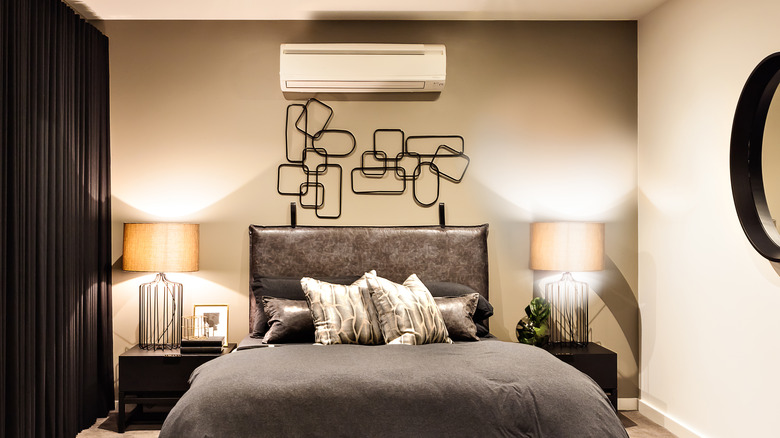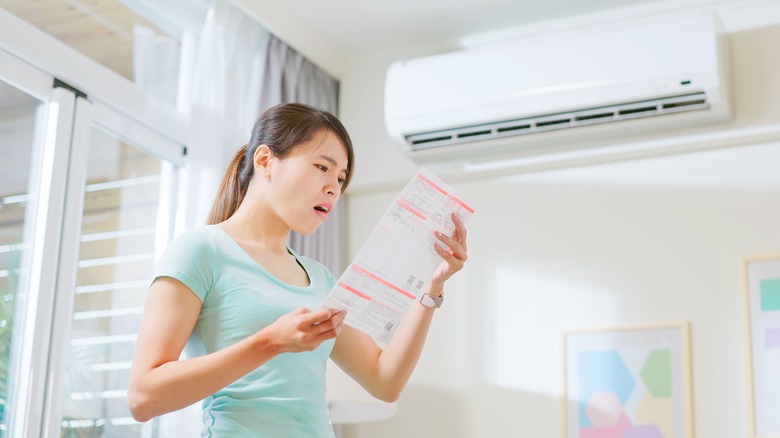Why You Should Consider Turning Off Your AC At Night
Even if the temperatures are a bit warmer than you'd like, turning off your air conditioning at night has more than a few benefits. By switching off your air conditioner in the moonlight hours, you can significantly reduce your energy consumption, which means a lower monthly utility bill. It's also thought that sleeping without your AC running promotes better sleep by allowing your body to adjust to a slightly higher ambient temperature. Additionally, turning off your AC at night contributes to a healthier environment by reducing greenhouse gas emissions and enhancing air quality.
It's recommended that the best temperature to sleep at for optimal rest is between 65 and 75 degrees Fahrenheit. But even in the most ideal sleeping environment, it can be difficult to catch some restful shut-eye when you're preoccupied with the thought of a skyrocketing electricity bill. There are other ways to scoot around operating your AC full blast once your head hits the pillow, which we'll get into below, and there are several benefits to shutting it down overnight.
You'll save money
Air conditioning units are known to consume a significant amount of energy, so reducing their usage when it's not necessary can result in keeping your bank account a little happier. Leaving the AC running throughout the night leads to unnecessary energy consumption and higher utility bills. Keeping your unit off can prevent strain on the system and improve its overall efficiency. In addition, the constant operation of the AC can also make the air too cold, potentially causing harm because lower temperatures can lead to freezing of the evaporator or coiling coil component inside the unit. This can ultimately damage the compressor, which renders your AC unit inoperable. Ultimately, not running your AC unit while you sleep not only saves you money, but also saves the equipment for when you really need it ... like a scorching hot summer day.
If you're worried about staying cool while you sleep, you can implement other energy-saving techniques that can eliminate the need to switch off your AC at night. Upgrading to a programmable thermostat allows you to schedule temperature adjustments, including raising the temperature during the night to conserve energy. Using the fan mode instead of the cooling mode can circulate air and provide a cooling effect without excessive energy consumption. Don't underestimate natural ventilation by opening windows and using ceiling fans.
Take note that air conditioners also aren't great for the environment. Because they consume substantial amounts of energy, this means an increased electricity output, which emits more carbon dioxide into the air. These emissions contribute to the greenhouse effect, trapping heat near the Earth's surface and exacerbating global warming.
You'll help your health
Running your air conditioner at night may seem like a convenient way to beat the heat, but it can also have negative effects on your health and well-being. If the temperature dips below the recommended 65 degrees Fahrenheit, this can make you sluggish and lethargic, which means it's more difficult to get out of bed. Running your air conditioner at night can lead to dehydration as it dries out the air. This, in turn, increases the likelihood of experiencing headaches, not only due to the reduced moisture levels but also because of the lack of fresh, filtered air.
Improper air circulation and accumulation of contaminants due to dirty filters can also result in dry and itchy skin, nasal and throat irritation, and a sensitivity to dust mites and chemicals. On top of that, AC has a drying effect and can strip away the protective layer of mucus, which can make certain individuals more susceptible to infectious diseases. People with allergies and asthma may experience worsening symptoms in air-conditioned spaces because moisture accumulation inside the AC unit can promote the growth of mold, which can exacerbate allergic reactions and trigger asthma attacks.
Acclimatization to cold air can also have adverse effects on the body. Constantly exposing the body to low temperatures can make it difficult for your internal thermostat to adjust to warmer environments. This can lead to internal and external stress, which eventually takes its toll on your overall well-being.


